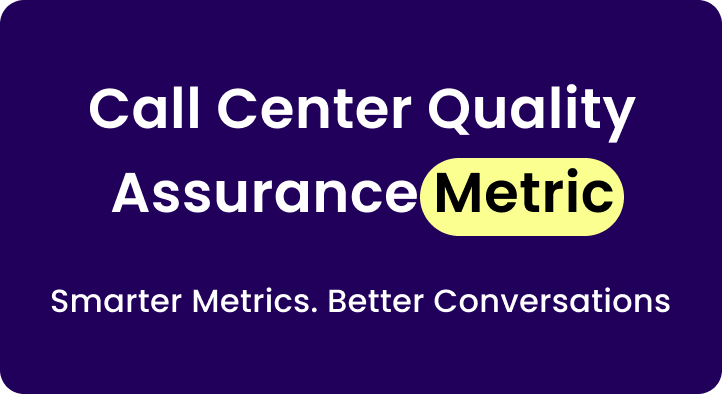Training doesn’t fix poor performance—targeted training does.
We get it—your agents want to perform better, but they need direction that aligns with real call expectations.
That’s where most call center training programs fall short.
They’re generic, disconnected from actual QA feedback, and barely move the needle.
In fact, 60% of contact center leaders say current training doesn’t improve call quality.
This guide walks you through how to build a training program that directly impacts CSAT, compliance, and agent performance, built for how today’s teams actually work.
Table of Contents
A. What is call center training?
Call center training is a structured process to equip agents with essential communication, technical, and soft skills to deliver consistent, high-quality customer service and meet organizational goals.
Key points
- Covers essential skills: call handling, product knowledge, empathy, and compliance
- Boosts QA metrics like CSAT, FCR, and resolution accuracy
- Uses formats like live sessions, eLearning, and role-plays
- Drives ongoing performance and customer satisfaction
- Prepares agents for objections, escalations, and compliance
- Fits all agent levels—new, underperforming, or top-tier
- Guided by QA insights to close real performance gaps
B. Why call center training should be QA-driven
Most training programs cover the basics—like product info, call flow, and scripts. But if you’re focused on improving quality scores, you need to go beyond that.
A quality-focused training program is built around the actual behaviors that lead to better QA scores, customer satisfaction, and compliance. It connects what’s being taught to what’s being measured. And it’s not a one-time session—it’s a continuous loop of learning, doing, and improving.
Here’s what a strong quality-focused program includes:
1. QA-Driven topics
Training should target common misses—like empathy, probing, and call control—so agents know exactly where quality breaks down and how to fix it.
How is it
- Review agent scorecards weekly.
- Identify top 3 low-performing behaviors.
- Create short learning modules focused on fixing those exact issues.
If agents lose points on call closings, create a 3-minute module on how to wrap up calls with clear next steps and gratitude.
2. Real Call Examples
Use sample call recordings to show the difference between poor, average, and excellent performance, based on actual QA evaluation criteria.
How is it
- Select real calls flagged during evaluations.
- Anonymize sensitive data.
- Highlight key timestamps to show good vs bad responses.
- Discuss outcomes with agents.
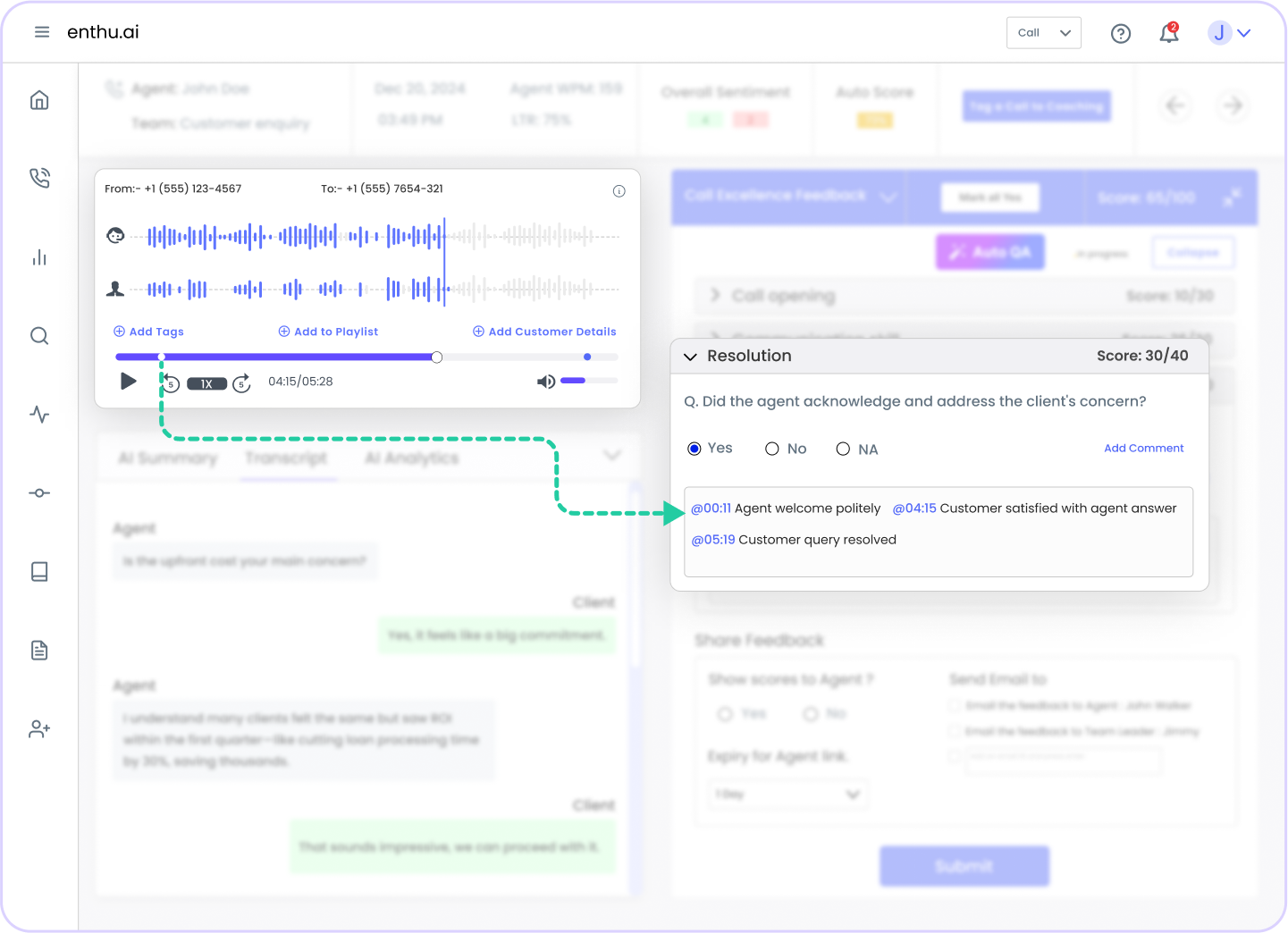
Play a call where the agent interrupted the customer. Pause and explain how it hurt the listening score and what should’ve been done instead.
3. Feedback loop
QA insights should guide training topics. The tighter the loop between evaluation and coaching, the faster agents correct issues and improve quality.
How is it
- Meet weekly with the QA team.
- Pull top agent issues from evaluations.
- Convert them into quick training refreshers or coaching sessions.
If agents miss verification steps often, launch a quick refresher and track if compliance scores improve in the next review cycle.
4. Continuous coaching
Ongoing coaching keeps agents improving. Short, regular sessions reinforce good habits, fix weak spots, and prevent skill gaps from turning into quality risks.
How is it
- Schedule bi-weekly coaching sessions.
- Use recent QA scores or flagged calls as material.
- Role-play or discuss better responses.
Coach an agent who had low empathy on three calls. Review one good and one bad call, and role-play better responses.
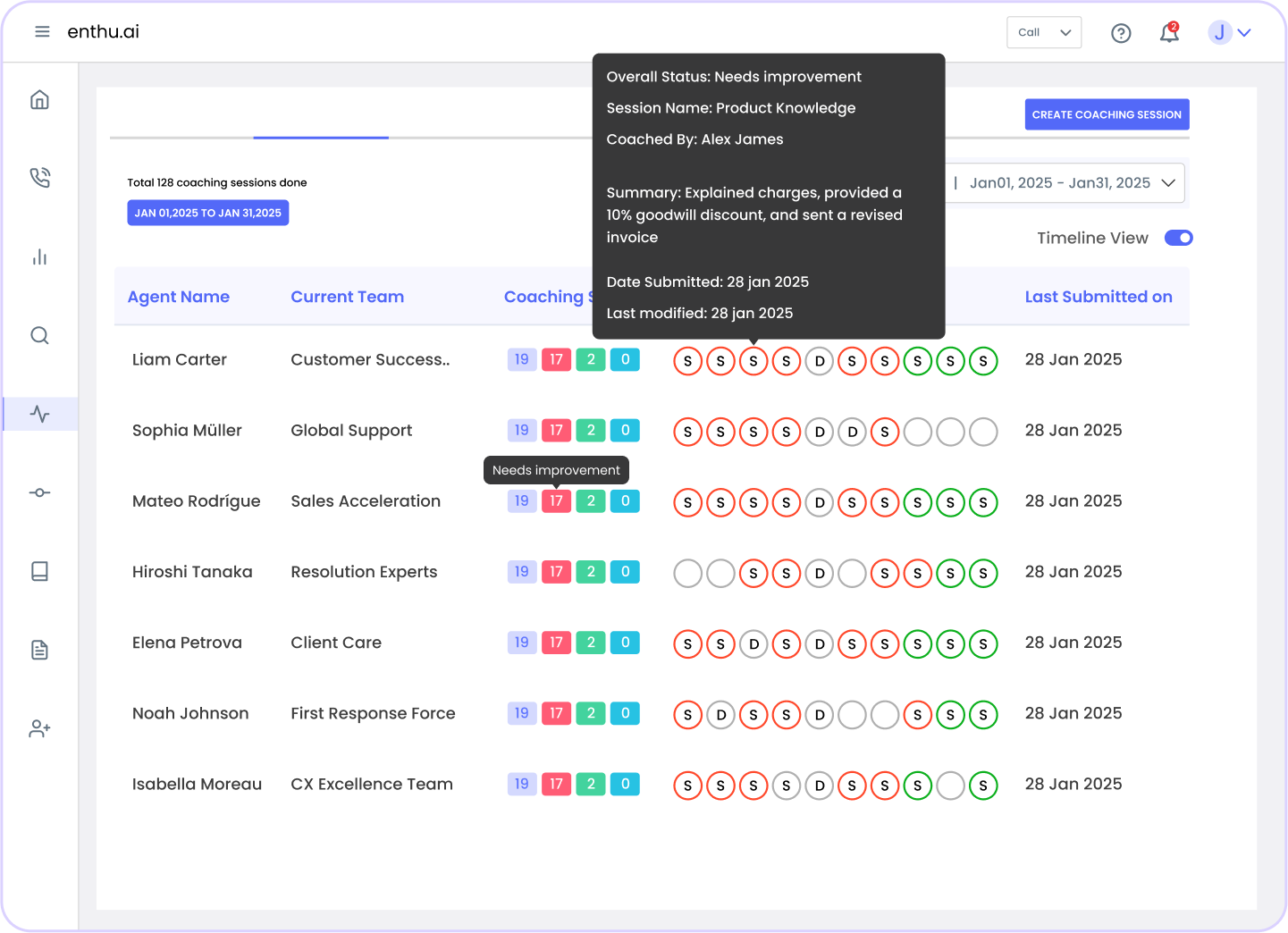
C. How to build a call center training program
1. Set clear training goals
Start with the “why.” Every training program should have clear, measurable goals that tie back to key metrics—think AHT, CSAT, or compliance scores. Don’t just train for the sake of it.
Ask yourself:
What performance gaps are slowing us down?
What KPIs do we want to improve?
How will we know if the training worked?
Clear goals = focused training = better outcomes.
2. Assess training needs
Guesswork doesn’t cut it. Use real data to find out what your agents actually need help with. Here’s where to look:
- QA scorecards: Spot consistent low scores—greetings, tone, or process gaps.
- Customer feedback: Surveys and reviews reveal pain points straight from the source.
- Call recordings: Listen to real calls. You’ll hear what reports miss.
- Team leader insights: Coaches and TLs see the action in real time. Their feedback is gold.
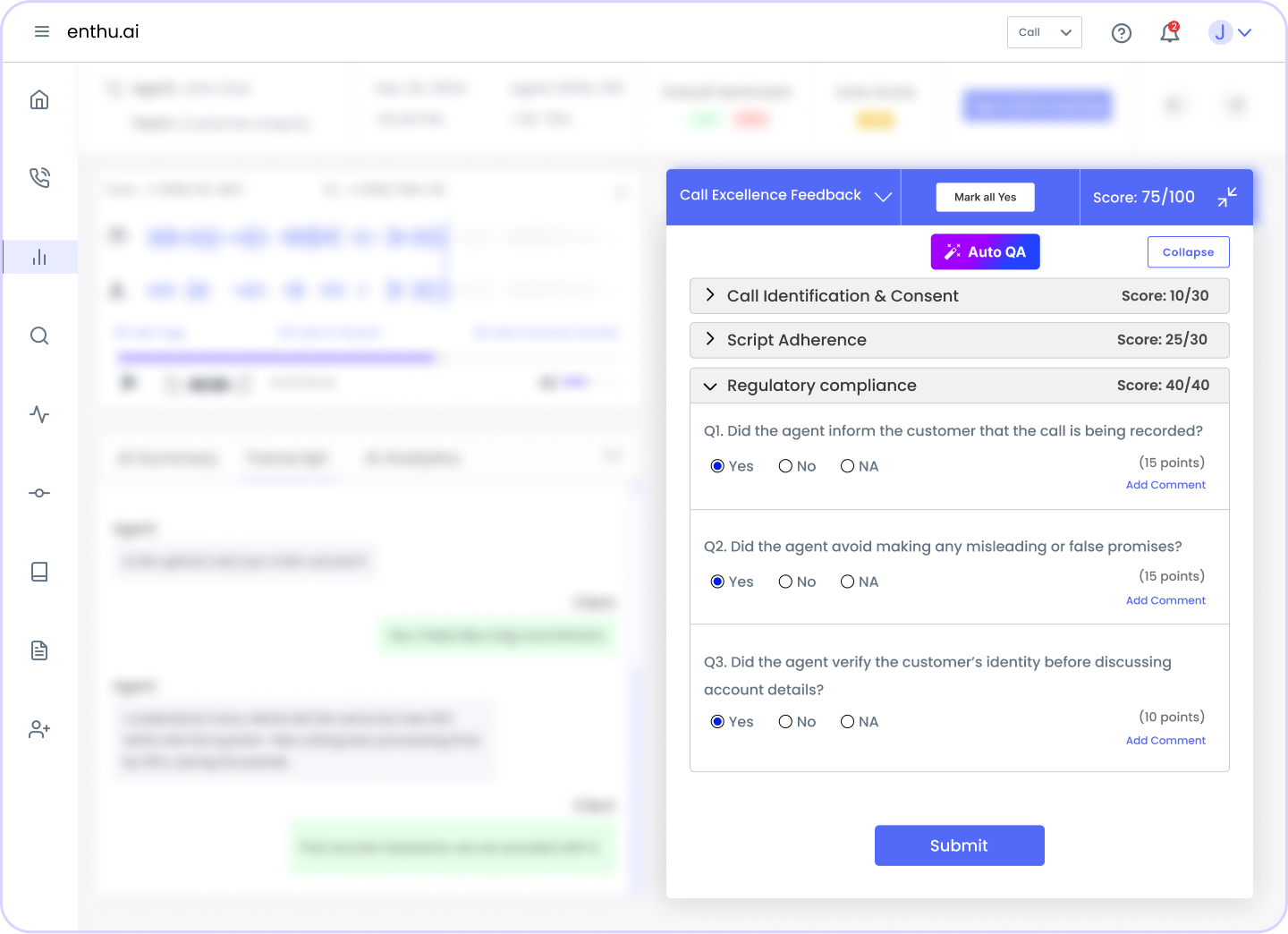
3. Design your training content
Now that you know what to fix, build content that sticks. No one wants a 2-hour monologue. Keep it light, interactive, and practical.
Different skills need different formats:
| Content Type | Purpose | Best Format |
| Process Training | Teach tools and workflows | Slides, screen shares |
| Soft Skills | Improve tone and empathy | Videos, role-plays |
| Product Knowledge | Support accurate responses | Quizzes, flashcards |
| Compliance | Reduce legal and audit risks | Policy docs, mock call drills |
Keep sessions short (under 30 mins), focus on one skill at a time, and use real call examples. Agents learn better when they can see the skill in action—not just hear about it.
4. Train in layers
Don’t dump everything on agents on Day 1. Spread it out. Layered training gives them time to absorb and apply what they’ve learned—without the overwhelm.
A simple structure could look like this:
| Timeline | Focus Areas | Training Activities |
| Week 1 | Company basics, tools, and core processes | Slides, tool walkthroughs, policy overviews |
| Week 2 | Call handling with support | Shadowing, mock calls, assisted live calls |
| Week 3+ | Deeper skills and coaching | Role-plays, QA feedback, 1:1 sessions |
| Ongoing | Continuous improvement | Monthly refreshers, skill-specific workshops |
Start with the foundation, then build. And always offer support in those early days—shadowing, co-handling calls, and instant feedback make all the difference.
5. Track, improve, repeat
Training doesn’t end when the session does. Keep tracking how agents are performing post-training.
Here’s what to watch:
- QA scores: Are they improving week over week?
- Escalations: Are agents resolving more without help?
- CSAT: Are customers happier now?
- FCR: Are issues getting solved on the first call?
Ask agents for their feedback too—what worked, what didn’t, what they’d like more of. Use that to tweak your next round of training. Keep improving it like it’s a living, breathing thing. Because it is.
D. How to Structure the Training for Maximum Impact
A strong training program isn’t just about what you teach—it’s how you deliver it. To make training stick, it’s important to use the right formats, keep sessions short, and track progress regularly.
1. Use mixed learning formats
Mixing formats like videos, quizzes, and role-play helps make the learning process engaging and effective.
Each format has its own role: videos are great for explaining concepts, quizzes check understanding, and role-plays help agents practice in real-life situations.
How it’s done:
- Start with a short explainer video (2-3 minutes) on a specific skill.
- Follow it up with a short quiz (3-5 questions) to check retention.
- End the session with a role-play to apply the learning.
Example:
To train agents on handling angry customers, play a short video showing good and bad examples, quiz them on what they noticed, and then do a role-play based on a tough customer call.
2. Decide the right duration & frequency
Short, frequent training sessions work best. Agents are busy, so you want training to be easy to absorb and not feel like a burden.
- Ideal duration: 20 to 30 minutes per session.
- Frequency: Once or twice a week is enough.
- Structure: Break long topics into smaller lessons (microlearning).
Keeping the format consistent helps agents form a habit of learning, and the short duration prevents fatigue or boredom.
3. Track progress with the right tools
Tracking is essential to see if the training is actually working. Use QA dashboards to monitor agent scores and performance. Combine that with self-assessments so agents can reflect on their own learning.
- Use QA dashboards (like the one in Enthu.ai) to track call quality, tone, and resolution accuracy.
- Add quick self-assessment forms after each session to collect agent feedback.
Enthu.ai lets you easily track how training impacts real call outcomes. You can see agent performance trends over time, helping you adjust training focus as needed.
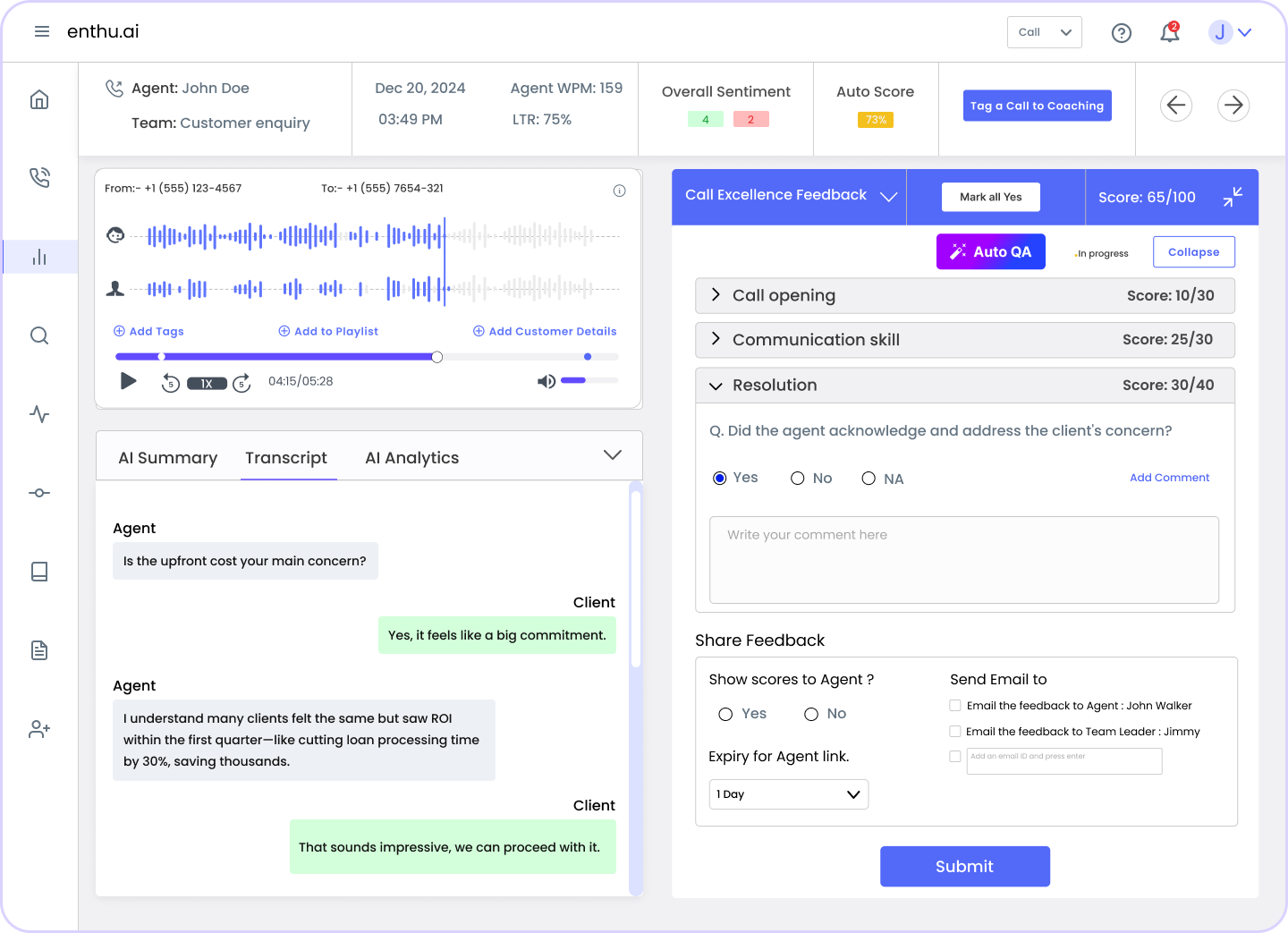
D. Coaching and feedback integration in training
Training isn’t just about transferring skills. Real growth happens when coaching and feedback become an ongoing part of an agent’s daily routine. It’s a continuous process of improving mistakes, sharpening skills, and keeping agents motivated to perform better.
1. Make training part of daily work
Coaching should be a regular part of the workflow. When agents receive feedback on their real-time performance, they learn faster and improve their habits more effectively.
- Providing feedback immediately after a call ensures agents remember how they performed in the moment, rather than waiting for a formal review.
- Focusing on one specific area at a time makes coaching actionable and prevents agents from feeling overwhelmed with too many points at once.
2. Use QA forms to support conversations
QA forms are not just for scoring — they serve as a structured guide for coaching.
These forms break down key performance areas like tone, problem-solving, and accuracy, helping the QA team give focused feedback.
QA forms allow you to track long-term trends, making it easier to see consistent areas for improvement across multiple calls.
Pro tips – For QAs, using structured forms ensures feedback is fair and objective. Agents clearly understand which areas need attention, and QAs can assess performance consistently and with precision.
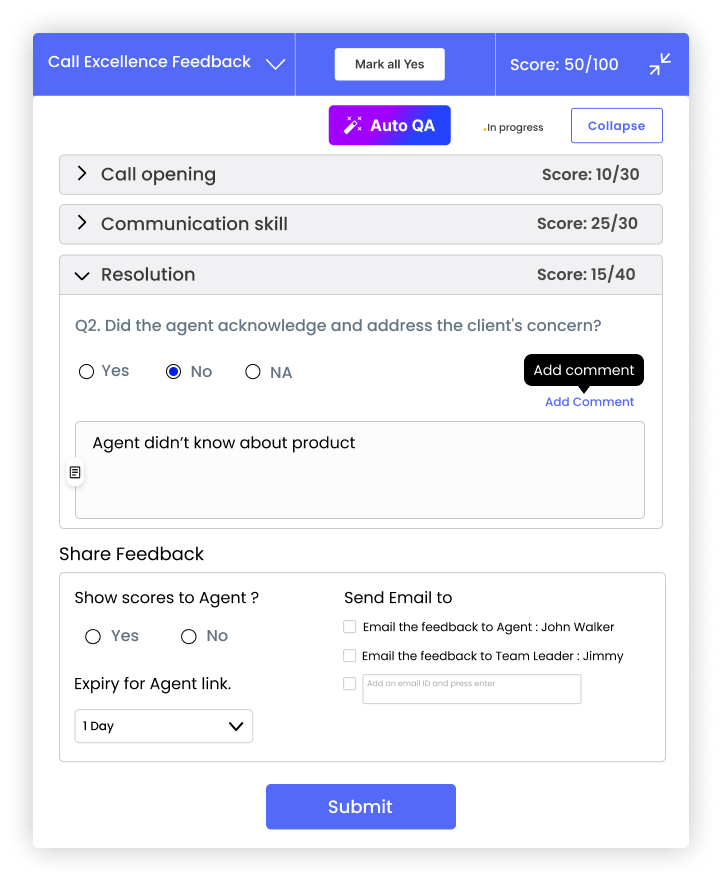
3. Hold regular 1:1 coaching sessions
In addition to daily feedback, regular one-on-one coaching sessions give agents the chance for deeper, more personalized development.
These meetings allow for reviewing trends, discussing challenges, and setting specific improvement goals.
Bi-weekly or monthly sessions are ideal for ensuring agents have enough time to work on feedback and show progress.
Pro tip – Coaching sessions provide a dedicated space for agents to discuss their challenges and growth. This shows agents that their improvement is a priority and gives QAs the opportunity to track progress more closely.

4. Let agents reflect too
Coaching should not be one-sided. Encouraging agents to reflect on their own performance helps them develop self-awareness and take ownership of their improvement.
Encourage agents to complete self-assessments after each QA review, where they reflect on their strengths and areas for growth.
Conclusion
Generic training doesn’t cut it anymore.
If you want better CSAT, fewer escalations, and confident agents—you need training that’s QA-driven, data-backed, and built around real calls, not classroom theory.
Use performance insights to shape every module. Deliver training in short, focused layers.
And make sure it ties back to the KPIs that matter—AHT, FCR, compliance.
Platforms like Enthu.ai make this easy by turning call data into clear training opportunities—so you’re always solving real problems, not imagined ones.
Because at the end of the day, it’s not about training more. It’s about training smarter.
FAQs
What is the role of speech analytics in call center training? Speech analytics tools analyze customer interactions to provide insights into agent performance, customer sentiment, and emerging trends. By leveraging this data, call centers can identify training needs, coaching opportunities, and areas for improvement, ultimately enhancing the quality of service. How can peer-to-peer learning benefit call center agent training? Peer-to-peer learning allows agents to share best practices, tips, and insights with their colleagues, fostering a collaborative learning environment. By learning from each other’s experiences, agents can enhance their skills, knowledge, and confidence, ultimately improving overall performance. Why is continuous learning important in call center agent training? Continuous learning ensures that agents stay updated on industry trends, product updates, and best practices. By offering ongoing training and development opportunities, call centers can keep agents engaged, motivated, and equipped with the skills necessary to deliver exceptional customer service consistently.

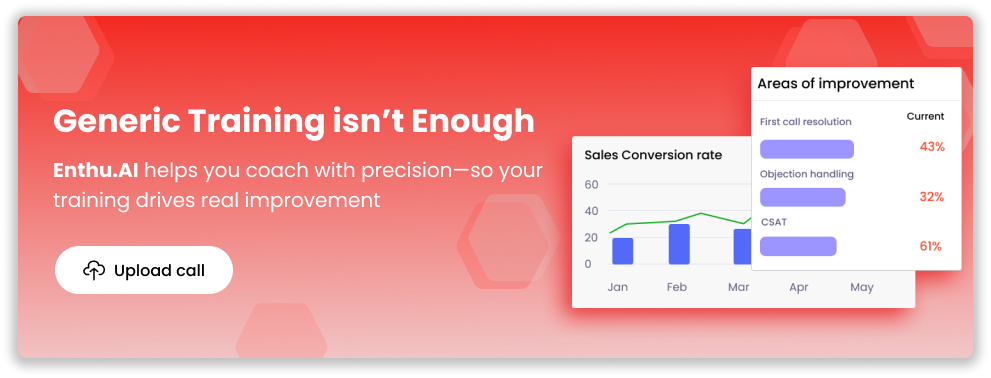
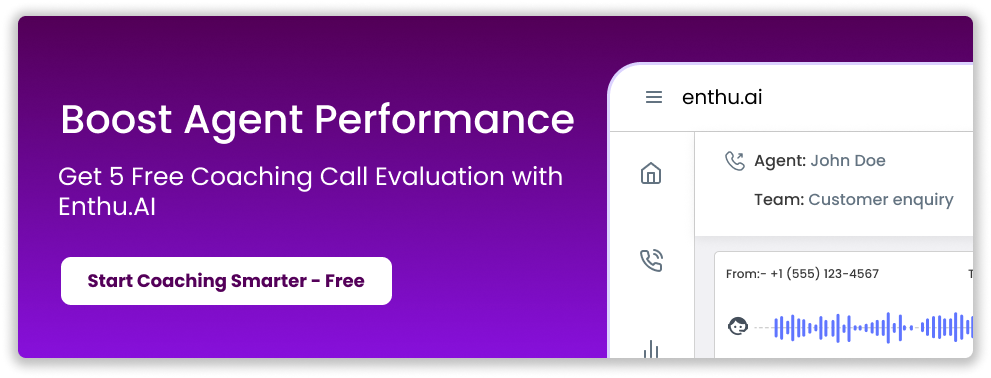


 On this page
On this page